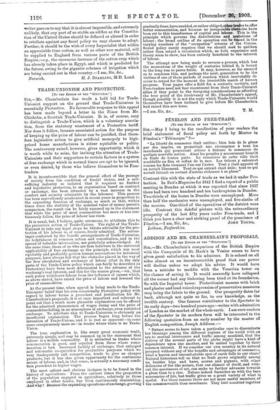TRADE-UNIONISM AND PROTECTION.
[To THE EDITOR OF THE " SPECTATOR."] Sra,—Mr. Chamberlain has made a bold bid for Trade- Unionist support on the ground that Trade-Unionism is essentially Protective. No favourable response to this appeal has been made beyond a letter in the Times from Mr. Chisholm, a Scottish Trade-Unionist. It is, of course, easy to distinguish a Trade-Union, which is a voluntary associa- tion, from the statutory enactment of a Protective tariff. Nor does it follow, because associated action for the purpose of keeping up the price of labour can be justified, that there- fore legislative action to give artificial monopoly to high- priced home manufactures is either equitable or politic. The controversy raised, however, gives opportunity, which it is worth while to seize, for inviting the attention of Trade- Unionists and their supporters to certain factors in a system of free exchange which in normal times are apt to be ignored, or even denied, by those who believe themselves to be Free-
traders.
It is incontrovertible that the general effect of the passage of society from the condition of feudal status, and a self- sufficing industry so isolated that it requires no further and legislative protection, to an organisation based on contract or exchange, has been attended by a vast increase in the comfort and security attainable by the labourer. This process has been marvellously accelerated in recent years in proportion to the expanding freedom of exchange, so much so that, within times since the stability of the nominal value of money permits comparison, the result can be fairly summed up in the statement that while the price of most commodities has more or less con- tinuously fallen, the price of labour has risen.
It is usual, but, I believe, quite erroneous, to attribute this to the protective action of Trade-Unions. The right of the Trade- Unionist to take any legal steps he thinks advisable for the pro- tection of his labour is, of course, freely admitted. The advan- tages conferred by the benefit arrangements of Trade-Unionism, its helpfulness in common action and consultation, and in the spread of valuable information, are gratefully acknowledged. At the same time, those of us who are firm believers in the universal applicability of free exchange as the principle which can most equitably and profitably govern human associations for industrial purposes, have always felt that the obstacles placed in the way of the free circulation and exchange of labour (that is, the only parts of the Trade-Union policy which can fairly be described as Protective) have been most detrimental to the advance of the workman's real interest, and this for the reason given,—viz., that such policy withdraws labour from the influence of causes which, as above stated, have raised the price of labour and lowered the price of commodities.
At the present time, when appeal is being made to the Trade- Unionists' belief that his own occasionally Protective policy with regard to labour forms a precedent and justification for Mr. Chamberlain's proposals, it is at once important and relevant to point out that a much more plausible explanation can be offered for the admitted phenomenon of wages rising and the price of commodities falling in an atmosphere of exchange, even restricted exchange. To attribute this to Trade-Unionism is obviously an insufficient eiplanation. The process began long before the invention of Trade-Unions, and it is just as apparent—in some cases conspicuously more so—in trades where there is no Trade- -Union.
The true explanation is, like every great economic truth, extremely :simple, and may be summed up in the statement that labour is a mobile commodity. It is attracted to trades where remuneration is good, and repelled from those where remu- neration. is bad. Increased facility of exchange, that enlarged and automatic co-operation for productive purposes which we very inadequately call competition, tends to give us cheaper products, but it has also given opportunity for the continuous ascent of labour, and, in that sense, is actually a necessary condi- tion precedent to higher wages.
The most salient and obvious instance is to be found in the history of agriculture. From the earliest times the proportion of the population engaged in agriculture, relatively to those employed in ether trades, has been continuously diminishing. And ivliy.? Because the expanding operations of exchange, growing
gradually freer, have enabled, or rather obliged,other trades to offer better remuneration, and because no insuperable obstacles have been set to this transference of capital and labour. This is tho principle which governs the distributions and mutations , of labour ; the broad outline of its operation can be traced in the varying numbers of the "occupation" returns of the Census. Sound policy surely requires that we should seek to quicken rather than retard a circulation which, as both experience and theory seem to show, has been entirely beneficial to the interest of labour.
The attempt now being made to reverse a process, which has the momentum of the weight of centuries behind it, is bound in the long run to prove futile. It may, however, so far succeed as to condemn this, and perhaps the next, generation to be the victims of one of those periods of reaction which inscrutably do occur to retard for the moment the irresistible march of human progress. Your pages offer a field for a contentio veritatis, and Free-traders need not fear resentment from their Trade-Unionist allies if they point to the foregoing considerations as affording the true proof of the irrelevancy of Mr. Chamberlain's appeal, though possibly it is not the reply which Trade-Unionists would themselves have been inclined to give before Mr. Chamberlain had raised this new issue.






































 Previous page
Previous page